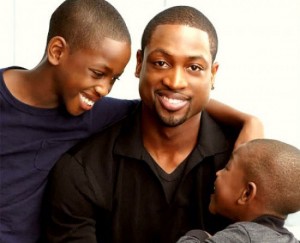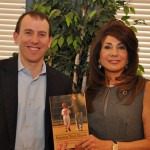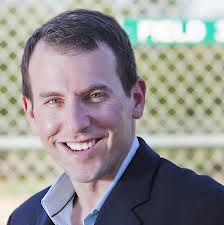Today we have a special guest post from Ethan J. Skolnick Lead Writer covering the Miami Heat and the NBA and Dr. Andrea Corn a licensed psychologist to talk about effective communication skills.
They offer some excellent advice and insights some that is shared in the Effective Communication Skills video below.
There’s going to be good reasons why children do leave organized sports at the age of 13. It is a pivotal age. You are shifting from elementary to middle school. You are at the cusp of adolescence, early adolescence and puberty. There are many changes going on, whether physically, emotionally, or mentally. Their interests are changing. Their friends are changing. They are able to maybe assert themselves a little more. A parent put them in the sport and they don’t like it or they had a bad experience. Or the child realizes they are not as talented and they may go on to something else. It may be a different sport.
The parents who are very focused on the outcome or winning, put a disproportionate emphasis on it. We want to help those parents pay attention to the inner world of the child. To really think about what it feels like to be a child; to really be a tool into their thoughts and their feelings. Because if they can help their child along the journey, then the youth sport experience is going to be much more fun and rewarding, regardless of where they go in their lives in sports.
One of the chapters in the book is all about communication. What we are saying is you have to be able to talk and communicate with your child. No two children are the same. They all have different temperaments, personalities, some can handle criticism better than others, and some are tougher skin.
The point being is that they have fears, that they have doubts, they have insecurities. Even the most well-meaning parent can hire a coach and send a child to an academy, but they also have to help them deal with what is on the inside and that is invisible. You have to be able to know how to bring that out.
I know my parents were well-meaning, but they did not know how to ask me about what is making you uncomfortable. Why are you feeling insecure? We just want to give parents ideas of what to think about and what they can do to help their child along the way.
I think the story that touches on that the most is one that was told by Cliff Floyd, who played for the Marlins and for the Cubs and for the Expos, and retired about three years ago to go into broadcasting. Cliff was the least likely kid you would think to be shy. He was always athletically gifted, huge, strapping, burly kid when he was growing up. He was actually very shy and very insecure and he didn’t want a lot of attention. As he told us, he mother basically expected him to hit a thousand all the time and be fit. He didn’t want the attention that came with being great to the point that he didn’t want to pursue something or be his best because he was afraid it would draw attention to him.
that touches on that the most is one that was told by Cliff Floyd, who played for the Marlins and for the Cubs and for the Expos, and retired about three years ago to go into broadcasting. Cliff was the least likely kid you would think to be shy. He was always athletically gifted, huge, strapping, burly kid when he was growing up. He was actually very shy and very insecure and he didn’t want a lot of attention. As he told us, he mother basically expected him to hit a thousand all the time and be fit. He didn’t want the attention that came with being great to the point that he didn’t want to pursue something or be his best because he was afraid it would draw attention to him.
To show how long this can last with someone, Cliff went through his entire major league career, played 15 seasons even through injuries and hit a lot of home runs, and had a lot of success, made all-star teams. It wasn’t until after he retired that he went back to his mother and said the way that you communicated with me when I was young was not the best thing for me. That stuck with him all those years.
This is a kid who ended up making it in a sport, who is so outrageously gifted and managed to pursue it. But how many kids are out there, who feel the way that he did, but did not have his gifts to overcome it and how does that live with them for the rest of their lives? In his case too, he said his mother was well-meaning, but she just did not understand how to communicate with him.
 The story that Andrea is referencing with Dwayne Wade is he has two sons, and one of them is much more receptive to criticism than the other. It took him some time to recognize that.
The story that Andrea is referencing with Dwayne Wade is he has two sons, and one of them is much more receptive to criticism than the other. It took him some time to recognize that.
One of the key takeaways we want people to get from the book is that we are not saying there is one way of doing this with any child. In fact, we are saying the opposite. We are saying there is not one way of doing it and a lot of it depends on how well you understand the child.
It is so easy to misunderstand nike outlets sell jordan 1 the child because they want so much to please that parent or that coach and to think that they are proud of them. If they see a stern look or an angry look or an upset look, they are going to personalize it often times. They are going to think they are doing something wrong.
To us it is so much about, keeping the focus on fun and the effort as well as being persistent and trying – not just looking for the results.
We have a lot of athletes who are parents themselves and we focus on that quite a bit on the idea of how they are dealing with their own kids. Again, these are athletes who know more about a particular sport than any of the other parents would. Yet, the majority of them when I spoke to them said they try to stay quiet when they are out there. Their feeling is that having too many distracting messages nike metcon 9 coming from too many different people is a negative for the child and it is confusing.
Parents need to learn to work in concert with the coaches ir jordan 11 bred game worn 1996 finals auctio as much as possible, instead of in conflict. Parents should try to do his or her best, or the mentor or whoever it is, to work with the coach to present one message to the child to not be contradicting what the coach said as soon as you get in the car. At the same time, there will be points when the coach is not behaving properly and that is when the parents then have to step in. To a certain degree, there should be some level to say not just drop your kids off and forget about it. You stay vigilant without meddling if there is a way to do that. Essentially you want to show up, you want to show interest, and you want to show restraint.
Sometimes if the parent can’t be there, show interest in the way the child feels good. Tell me about your experience. What did you enjoy? What do you remember that you had the most fun doing? Not that did your team win? Or did you hit a home run? I hope you didn’t strike out.
Ethan J. Skolnick is a Lead Writer covering the Miami Heat and the NBA. Prior to joining Bleacher Report and Turner Sports full-time, he had been a South Florida sportswriter for 17 years, covering all the major pro and college teams and just about every major sporting event for The Palm Beach Post, The South Florida Sun-Sentinel and The Miami Herald. In addition to his duties for Bleacher Report and Turner Sports, he still appears regularly as a co-host and Miami Heat analyst on The Ticket radio station based out of Miami, on 790AM and 104.3 FM.
 Dr. Andrea Corn is a licensed psychologist who specializes in the diagnosis and treatment of emotional and behavioral problems affecting children, adolescents, and adults. Areas of specialization include reducing anxiety, treating depression, unresolved anger, or learning how to better handle your relationships.
Dr. Andrea Corn is a licensed psychologist who specializes in the diagnosis and treatment of emotional and behavioral problems affecting children, adolescents, and adults. Areas of specialization include reducing anxiety, treating depression, unresolved anger, or learning how to better handle your relationships.
To order their book Raising The Game, click here.


